Best cloud orchestration software
We feature the best cloud orchestration software platforms, to more easily automate tasks and workflows across your clouds and on-premises application stacks
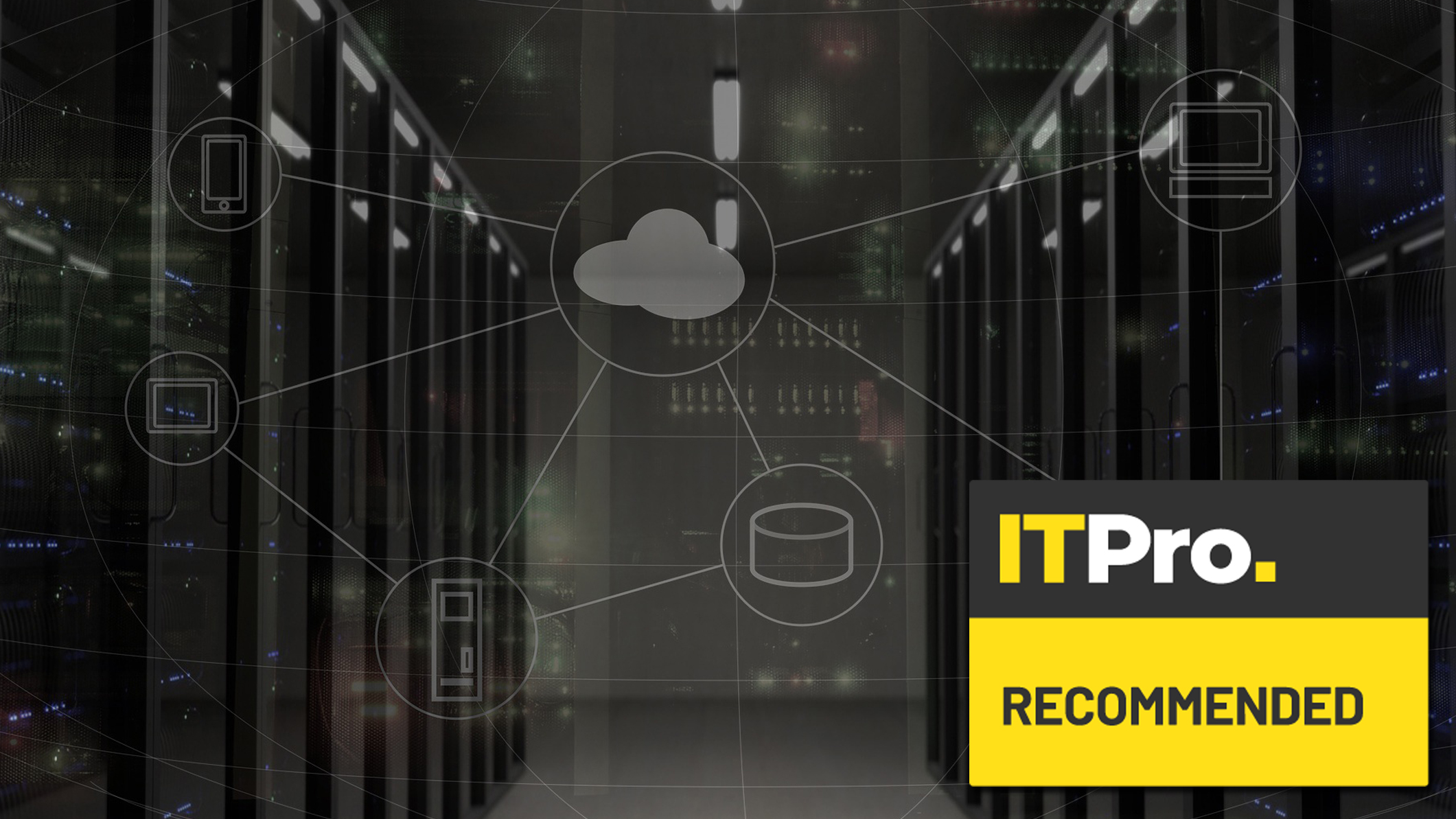
Sign up today and you will receive a free copy of our Future Focus 2025 report - the leading guidance on AI, cybersecurity and other IT challenges as per 700+ senior executives
You are now subscribed
Your newsletter sign-up was successful
The best cloud orchestration software platforms can easily automate tasks and workflows across your clouds and on-premises application stacks.
The best cloud orchestration software
Click the links below to go to the provider's website:
This is especially important as cloud computing services have become an increasingly essential part of the modern business, with public clouds, private clouds, and hybrid cloud strategies becoming an ordinary part of IT infrastructure.
However, managing different cloud systems can be a challenge, especially when it comes to the automated processes and workflows that run from them. This is where cloud orchestration software comes in, to provide a single platform through which you can better configure and control how you need automated functions to work.
This is essential because automated processes are involved in every part of cloud services, from saving data to cloud storage, to balancing networks, monitoring apps, or working with security and compliance - cloud orchestration aims to provide a way to manage all these simply and easily.
Additionally it can also aim to help automate processes as well as compare resource usage and cost projections so that what you do use is the most price-effective for your needs, without sacrificing service or quality.
Even though the very name cloud orchestration sounds intimidating, once in play you should have a properly balanced, manageable, and user-friendly network and application manager you can work with.
Here then are the best cloud orchestration platforms currently available.
1. Microsoft Azure Automation
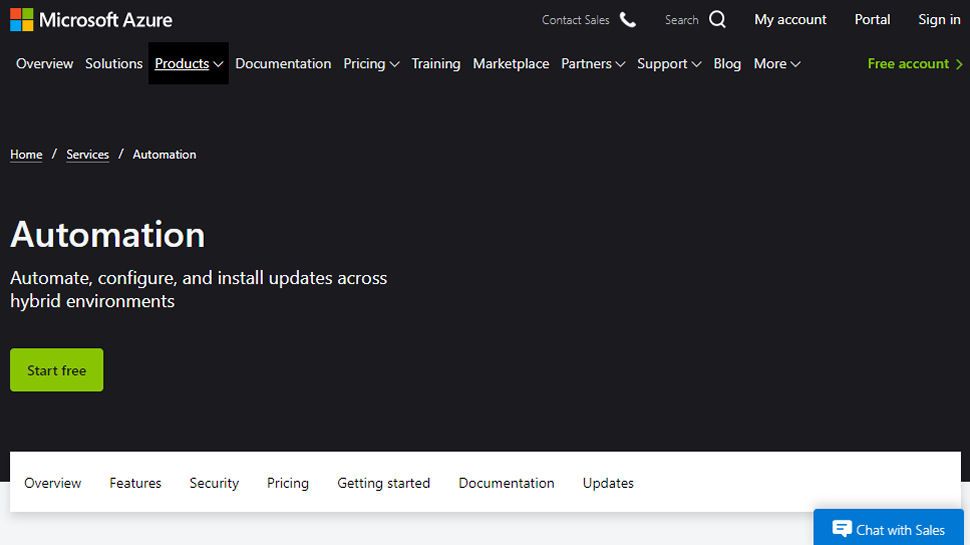
Manage automation in hybrid clouds or on-premises
REASONS TO BUY
- Manage configurations
- Cloud or on-premise
- Automate updates
Microsoft Azure Automation works within Microsoft's cloud services platform, and allows you to integrate different management systems. This makes it especially useful for managing automated tasks when dealing with hybrid cloud configurations.
With Azure Automation you can manage deployments not just within Azure but also hybrid clouds and on-premises infrastructure. This makes it easier to orchestrate updates across Windows and Linux software, with automation reducing the possibility of introducing errors.
You can also import configuration files, inventory system resource allocations, and use reporting to find information on any part of your IT infrastructure. Changes can be tracked across services making it easy to identify any issues that may require investigation.
Altogether, Azure Automation isn't just about automating tasks but about making complex systems easier to manage and monitor, and also ensure your systems are running cost-effectively and error-free.
2. Puppet Bolt
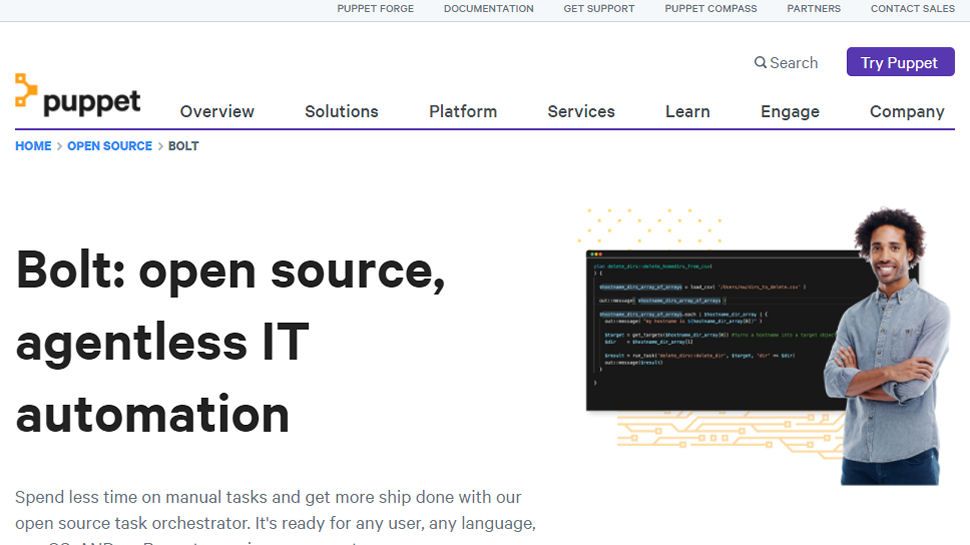
Open source orchestration and automation
REASONS TO BUY
- Free and open source
- Command line tool
- Wide scripting support
Puppet Bolt is a leading cloud management service for enterprises, with the Bolt service offering is focused specifically on cloud orchestration and automation management.
Bolt is a free and open source command line tool for Linux, macOS, and Windows, that aims to make it easy to set up plans for your application stack so as to avoid having to manually orchestrate workflows.
You can use existing scripts and plans in order to make changes and deploy upgrades across your IT infrastructure and cloud services more quickly. Plans can be written in YAML or Puppet, and all scripting languages are supported.
Bolt also works with Puppet's enterprise services so you can ensure security and compliance policies are set and enforced across your cloud services.
Online guides and a community can provide support and guidance for users, and boot camps are also available for training purposes.
3. BMC Multi-Cloud Management
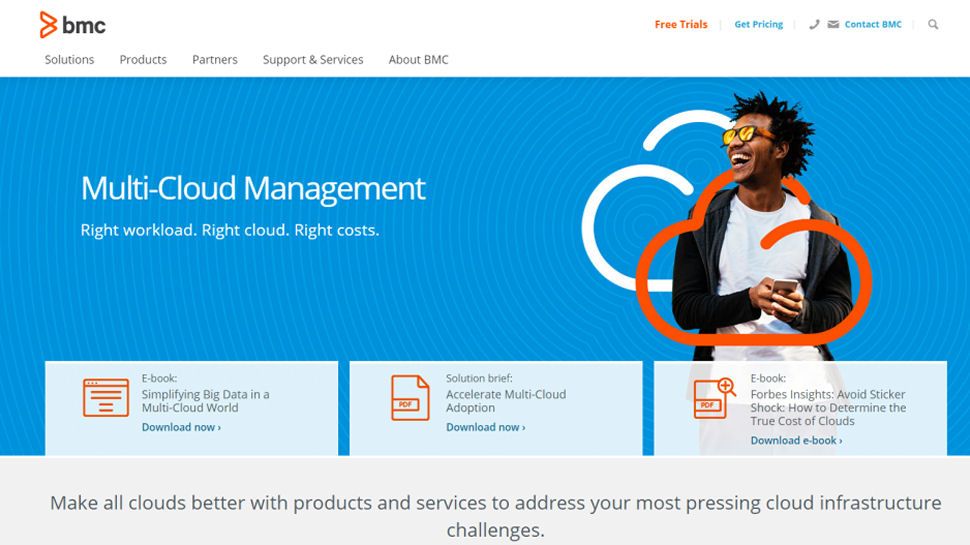
Making cloud management much easier
REASONS TO BUY
- Multi-cloud migration
- Asset mapping
- Manage and monitor
BMC Software produces software and services that assist businesses in moving to digital operations. These include IT service management, data center automation, performance management and cloud computing management.
BMC Multi-Cloud Management allows users to manage multiple clouds in a range of different ways. For example, there are features for cloud migration services, forecasting costs, as well as predictive service management.
Other features include multi-cloud visibility by mapping hybrid assets alongside the automation of dependency mapping. Automation management continues through workloads, workflows, and DevOps.
There's also monitoring of your clouds across hybrid environments, from which you can manage the performance of your apps to ensure a good user experience, while also allowing you to rapidly determine any problems quickly and easily.
4. Morpheus
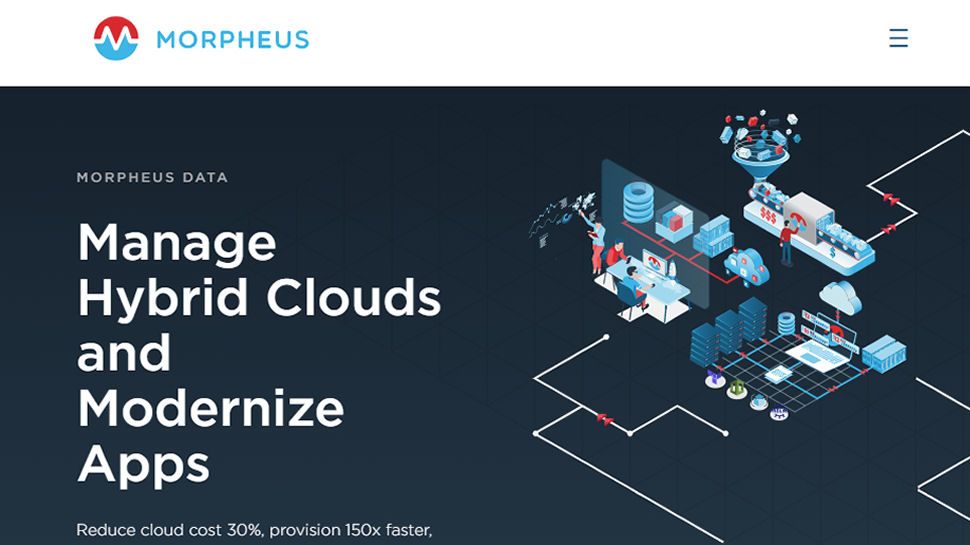
Fine tune your cloud access policies and control
REASONS TO BUY
- Supports containerised apps
- Advanced policy tools
- Pricing optimisation
Morpheus is a unified multi-cloud orchestration platform aimed at connecting developers to self-service infrastructure. It was founded in 2010. Clients listed are HSBC, Arris and McDonalds amongst others.
The platform offers users analytic features which provide insight into cloud spending. This allows users to compare costs as they use various cloud infrastructures and resources.
Users can build service catalogues, complex multi-cloud structures and access stack visualisation tools. Users can also govern and control access to cloud-resources using multi-tenant policies. Users can connect service catalogs to ServiceNow, create policies for workflows and keep track of configurations management activities.
Morpheus enables teams to set policies for handling service requests, scheduled automated clean-up activities and pause services during off hours.
The platform integrates with developments tools which manage source code, executing, deploying code and monitoring app performance. Users can access repositories from GitHub and Git. They can also deploy containerised applications using tools such as Kubernetes.
5. CloudHealth
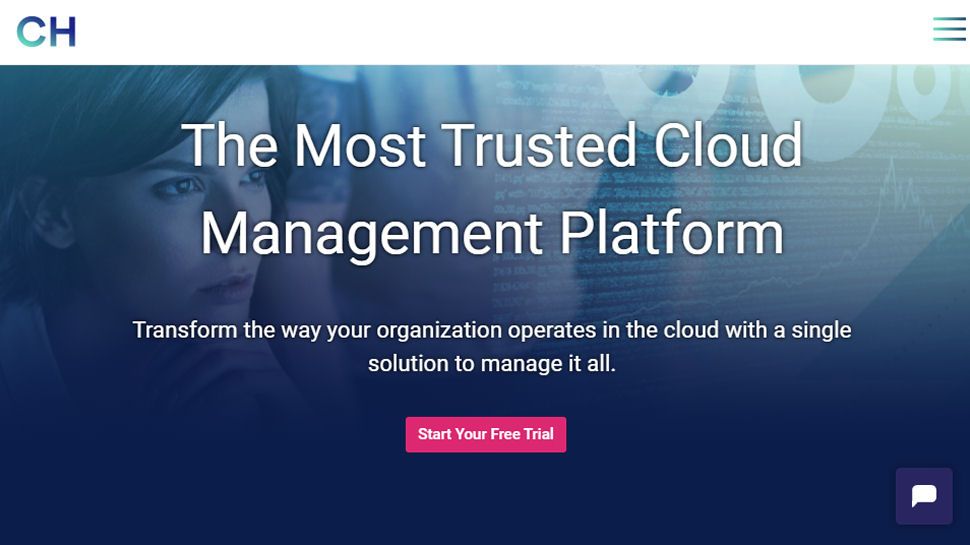
Hybrid cloud management platform from VMware
REASONS TO BUY
- Avoid hidden costs
- Plan for budgets
- Security and compliance
CloudHealth is virtualisation giant VMware's latest software platform aimed at managing hybrid cloud services for enterprises.
The platform covers a number of key areas, such as multi-platform visibility which provides all the reporting and data analytics you need through a customised dashboard. This allows you to see what resources are being used on a department, team, and individual level, so that these can be reallocated to reduce costs as necessary.
You can almost monitor overall costs to identify all costs, as well as discover trends so you can plan ahead to budget according growth models.
Security, compliance, and governance are also built in to ensure you can protect your data and users according to strict and developing policies, to avoid being caught out by a data breach or other leak.
VMware also provide CloudHealth with approved partner cloud services to help build and manage your clouds with exactly what you need, to ensure full compatibility, cost oversight, and security.
Other cloud orchestration options to consider
Advances in cloud technology have led to a profusion of cloud service providers. Sometimes the biggest difficulty is finding one that fits, especially if you need to manage legacy IT infrastructure while migrating services to the cloud, or if your company is having to manage multiple clouds and hybrids. Here we are highlighting some additional companies worth looking at if you need help orchestrating your cloud IT needs.
Embotics is a leader in Gartner's magic quadrant for cloud management platforms, providing services to companies such as NASA, and data center outfit Flexential. Its main offering is vCommander, which offers both easy deployment as well as extensibility to fit an enterprise's unique needs.
CloudBolt offers enterprise hybrid cloud platforms which aim to make self-service and scalability easy. It's especially geared towards orchestrating diverse IT infrastructures, particularly where legacy services need to be integrated into existing and future-planned platforms, not least using multi-cloud and hypervisor management.
Flexera offers a simplified cloud platform to manage existing or new workloads across any cloud or server. It boasts a very wide range of support integrations, including AWS, Azure, Google, IBM, VMware, and OpenStack, to name just a few. Even better, not only can RightScale offer managed and professional services, but also worldwide implementation.
VMware's vRealize Suite is another hybrid cloud management platform for orchestrating multiple clouds, not least major cloud systems such as AWS, Azure, and Google. It provides native integrations across the Software-Defined Data Center (SDDC) elements, for computing, networking, storage, and management.
OpenStack isn't so much a cloud management provider as an open source software solution for creating public and private clouds. This means that rather than rely on a third-party to try and simplify the process for you, you can work with the code directly to customise a solution that works for your specific needs. Naturally, bear in mind that you will need the relevant expertise to achieve this.
Sign up today and you will receive a free copy of our Future Focus 2025 report - the leading guidance on AI, cybersecurity and other IT challenges as per 700+ senior executives
Nate is a freelance technology writer based in Ireland, and has written for TechRadar and IT Pro Portal on a wide range of cloud and technology topics.
-
 Microsoft promises more AI spending despite cloud cost stumble
Microsoft promises more AI spending despite cloud cost stumbleNews Microsoft recorded revenue and earnings growth in its latest quarterly results, but higher than expected costs in cloud and AI raised investor concerns.
-
 Google wants regulators to break up Microsoft's OpenAI deal
Google wants regulators to break up Microsoft's OpenAI dealNews Google has already been nipping at Microsoft’s heels in the European cloud market over competition concerns
-
 How Mondra is targeting food net zero using Microsoft Azure cloud computing
How Mondra is targeting food net zero using Microsoft Azure cloud computingCase study Combining predictive AI and OpenAI models, the firm aims to shine a light on hard-to-pinpoint Scope 3 emissions figures
-
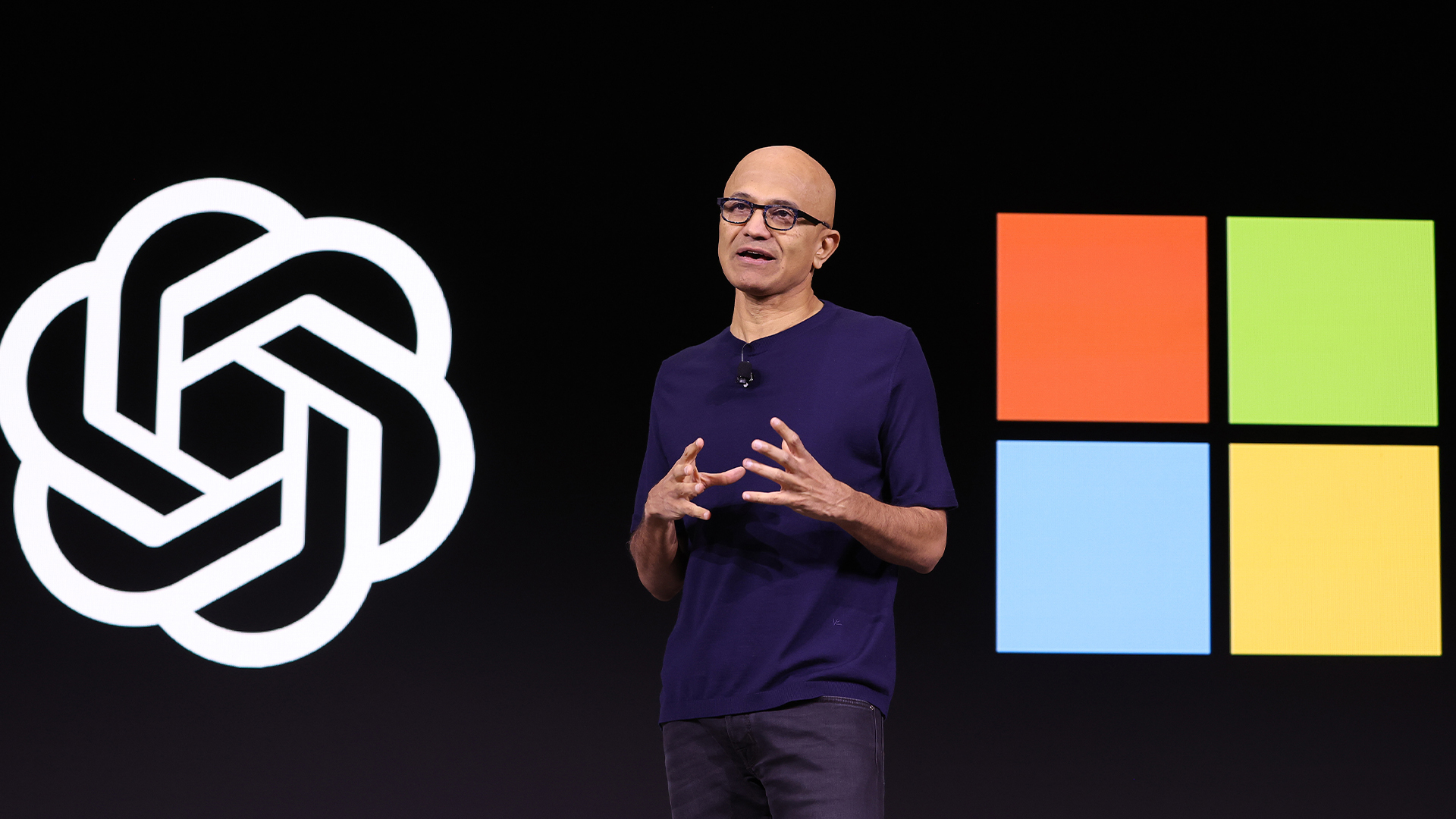 Microsoft facing FTC antitrust probe over cloud, AI competition concerns
Microsoft facing FTC antitrust probe over cloud, AI competition concernsNews Microsoft could be set for another antitrust battle, this time focused on cloud and AI
-
 How Satya Nadella's first decade at Microsoft took it from tech giant to undisputed industry titan
How Satya Nadella's first decade at Microsoft took it from tech giant to undisputed industry titanAnalysis Microsoft’s spike in value under Satya Nadella has taken it to lofty heights amid a sharpened focus on cloud and artificial intelligence
-
 Insight strikes new Microsoft agreement to drive cloud growth
Insight strikes new Microsoft agreement to drive cloud growthNews The new agreement builds on the organizations' existing AI-focused relationship
-
 Inside the Make-A-Wish Foundation ‘lift and shift’ cloud transformation
Inside the Make-A-Wish Foundation ‘lift and shift’ cloud transformationCase Study The charity wrestled with budgetary challenges to overhaul its legacy IT by tapping into Microsoft Azure
-
 Microsoft delivers statement of intent with AWS hire
Microsoft delivers statement of intent with AWS hireAnalysis Puneet Chandok joins Microsoft during a period of bullish growth in the Asia region

